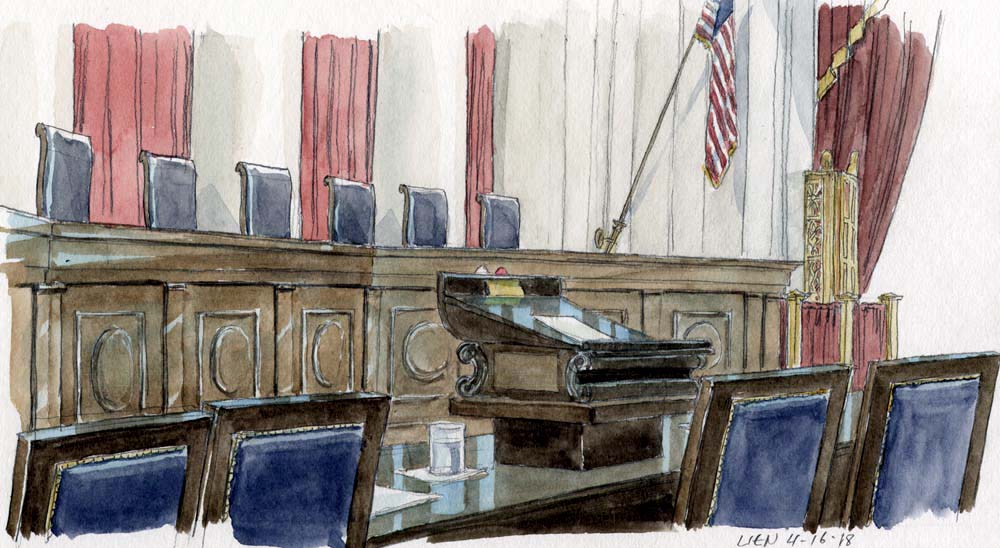Petitions of the week

This week we highlight petitions pending before the Supreme Court that address, among other things, whether police violate the Fourth Amendment when they conduct a suspicionless search of a probationer’s home, whether a defendant advancing a claim under Brady v. Maryland must demonstrate that he or she could not have uncovered the suppressed evidence through the exercise of due diligence, and whether there is a “good faith defense” to 42 U.S.C. § 1983 that shields a defendant from damages liability for depriving citizens of their constitutional rights if the defendant acted under color of a law before it was held unconstitutional.
The petitions of the week are below the jump:
Rose v. Select Portfolio Servicing Inc.
19-1035
Issue: Whether 11 U.S.C. § 362(c)(3)(A) terminates the automatic bankruptcy stay as to property of the bankruptcy estate.
PennEast Pipeline Co. v. New Jersey
19-1039
Issue: Whether the Natural Gas Act delegates to Federal Energy Regulatory Commission certificate-holders the authority to exercise the federal government’s eminent-domain power to condemn land in which a state claims an interest.
Pike v. Gross
19-1054
Issues: (1) Whether a defendant who asserts that trial counsel failed to present key evidence is precluded from showing prejudice under Strickland v. Washington, unless the evidence omitted at trial differs substantially in subject matter from the evidence actually presented; and (2) whether the Eighth and 14th Amendments prohibit condemning to death a defendant who was 18 years old at the time of the offense.
Hamm v. Tennessee
19-1059
Issue: Whether police violate the Fourth Amendment when they conduct a suspicionless search of a probationer’s home.
CJ CheilJedang Corp. v. International Trade Commission
19-1062
Issue: Whether, to avoid prosecution-history estoppel under Festo Corp. v. Shoketsu Kinzoku Kogyo Kabushiki Co., “the rationale underlying the amendment” must be the rationale the patentee provided to the public at the time of the amendment.
Comcast Corp. v. Tillage
19-1066
Issues: Whether the Supreme Court of California’s rule from McGill v. Citibank, N.A. – that provisions in predispute arbitration agreements waiving the parties’ right to seek “public injunctive relief” in any forum are contrary to California public policy and unenforceable – falls outside the Federal Arbitration Act’s saving clause because it is not a ground that “exist[s] at law or in equity” for the “revocation” of any contract; and (2) whether, even if the McGill rule falls within the FAA’s saving clause, it is otherwise preempted by the FAA because it interferes with fundamental attributes of arbitration by negating the parties’ agreement to resolve their dispute bilaterally.
Takeda Pharmaceutical Co. v. Painters and Allied Trades District Council 82 Health Care Fund
19-1069
Issues: (1) Whether the chain of causation between a manufacturer’s allegedly false or misleading statements or omissions and end payments for prescription drugs is too attenuated to satisfy the Racketeer Influenced and Corrupt Organizations Act’s proximate cause requirement, given that every prescription-drug payment depends on numerous intervening factors, including a doctor’s independent decision to prescribe; (2) whether everyone who pays for a product with an alleged latent risk or defect necessarily suffers injury sufficient to confer Article III standing, even when the product is fully consumed, provides the bargained-for benefits and causes no ill effects.
AT&T Mobility LLC v. McArdle
19-1078
Issue: Whether California’s public-policy rule conditioning the enforceability of arbitration agreements on acquiescence to public-injunction proceedings is preempted by the Federal Arbitration Act.
Dailey v. Florida
19-1094
Issues: (1) Whether a defendant advancing a claim under Brady v. Maryland must demonstrate that he or she could not have uncovered the suppressed evidence through the exercise of due diligence; (2) whether the materiality of a Brady claim must be determined by considering the probative force of the withheld evidence cumulatively and in the context of the government’s entire case; and (3) whether the Florida Supreme Court’s error in treating petitioner’s claim under Giglio v. United States as though it alleged knowing use of perjury, when it actually alleged withholding exculpatory evidence, warrants reversal.
Janus v. American Federation of State, County and Municipal Employees, Council 31
19-1104
Issue: Whether there is a “good faith defense” to 42 U.S.C. § 1983 that shields a defendant from damages liability for depriving citizens of their constitutional rights if the defendant acted under color of a law before it was held unconstitutional.
Posted in Relist Watch
Cases: Rose v. Select Portfolio Servicing Inc., PennEast Pipeline Co. v. New Jersey, Pike v. Gross, Hamm v. Tennessee, CJ CheilJedang Corp. v. International Trade Commission, Comcast Corp. v. Tillage, Takeda Pharmaceutical Co. v. Painters and Allied Trades District Council 82 Health Care Fund, AT&T Mobility LLC v. McArdle, Dailey v. Florida, Janus v. American Federation of State, County and Municipal Employees, Council 31